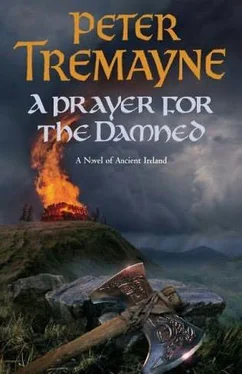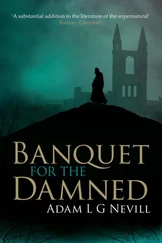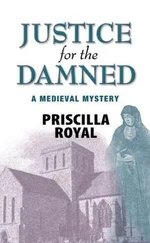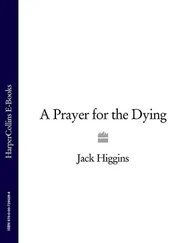Peter Tremayne - A Prayer for the Damned
Здесь есть возможность читать онлайн «Peter Tremayne - A Prayer for the Damned» весь текст электронной книги совершенно бесплатно (целиком полную версию без сокращений). В некоторых случаях можно слушать аудио, скачать через торрент в формате fb2 и присутствует краткое содержание. Жанр: Исторический детектив, на английском языке. Описание произведения, (предисловие) а так же отзывы посетителей доступны на портале библиотеки ЛибКат.
- Название:A Prayer for the Damned
- Автор:
- Жанр:
- Год:неизвестен
- ISBN:нет данных
- Рейтинг книги:4 / 5. Голосов: 1
-
Избранное:Добавить в избранное
- Отзывы:
-
Ваша оценка:
- 80
- 1
- 2
- 3
- 4
- 5
A Prayer for the Damned: краткое содержание, описание и аннотация
Предлагаем к чтению аннотацию, описание, краткое содержание или предисловие (зависит от того, что написал сам автор книги «A Prayer for the Damned»). Если вы не нашли необходимую информацию о книге — напишите в комментариях, мы постараемся отыскать её.
A Prayer for the Damned — читать онлайн бесплатно полную книгу (весь текст) целиком
Ниже представлен текст книги, разбитый по страницам. Система сохранения места последней прочитанной страницы, позволяет с удобством читать онлайн бесплатно книгу «A Prayer for the Damned», без необходимости каждый раз заново искать на чём Вы остановились. Поставьте закладку, и сможете в любой момент перейти на страницу, на которой закончили чтение.
Интервал:
Закладка:
The abbot seemed to pull himself together. ‘Her image still does. How many nights have I not been able to sleep as I run the events of that day through my mind, saying “if only”. If only I had not been so blind as to fail to see the tragedy that was about to unfold; if only I. . Ah, well. Sic erat in fatis , to quote Juvenal again.’
‘So it was fated,’ Eadulf repeated. ‘So you blamed yourself for her death and that is why you took such trouble. Was her involvement with the religieux from Cill Ria known at that time?’
‘It was. She was a poetess. I found out about the gathering at Ard Macha from some who had attended. I began to make inquiries about this boy, Senach, with whom she had fallen in love, and traced him to Cill Ria. I then found out what had happened to the boy.’
Eadulf was approving. ‘It sounds as though you would make a good investigator, Augaire. So it was you who discovered the details. Searc had not told her sister, or Muirchertach?’
‘It seems not.’
‘Having discovered this information, what then?’ asked Fidelma.
He replied with quiet vehemence: ‘I swore vengeance on those who had prevented that young girl from achieving happiness, and in her grief had compelled her to her death. .’
‘But what did you do in practical terms?’
Abbot Augaire seemed to shake himself and resume his normal demeanour. ‘I went to Muirchertach and Aíbnat and told them what I had discovered. Muirchertach was pleased. .’
‘Pleased? That is an odd way to react to this tragic tale.’
Abbot Augaire thought for a moment. ‘Perhaps I have used the wrong word? He was pleased by the revelation of the truth about Searc. I had resolved the mystery as to why she had killed herself.’
‘Was Aíbnat also, er, pleased?’
Abbot Augaire suddenly grimaced. ‘Aíbnat is a fine noble lady of the Uí Briúin but her main emotions are irritation and anger and those she has in abundance. She made no comment, not even gratitude for the resolution of this mystery. She is a dour, sombre soul.’
‘Perhaps with reason?’ queried Fidelma. ‘Her young sister killed herself. That is reason enough to be sombre.’
Abbot Augaire leaned forward as if confiding something. ‘Truth to tell, Fidelma of Cashel, I do not think that she was overly upset by the death of her sister. I heard rumours during my. . er, investigations. It was said that there was n6 love lost between them. Indeed, I heard that Aíbnat showed some jealousy at her sister’s beauty.’
‘But she was angry enough to start this demand for compensation against Ultán of Cill Ria?’ Eadulf pointed out.
Abbot Augaire glanced at him and then shook his head. ‘That was Muirchertach’s idea. He said it would please his wife. But the idea was put to me without consultation with Aíbnat. I found out later that she was against the idea.’
‘How did that come about?’ asked Fidelma.
‘Well, at first, as I said, Muirchertach was pleased with what I had done. He wanted to reward me. He had the power to make me abbot in one of the kingdom’s abbeys.’
Fidelma nodded. It was not an unusual matter for kings who had great influence in their territories to offer ecclesiastical rewards.
‘Only a few months before, the Blessed Féchin, the abbot of Conga, just north of Loch Corrib, had succumbed to the Yellow Plague. These events, you understand, happened, in fact, about the same time of the great council at Witebia.’
‘I had heard that Abbot Féchin had fallen sick and died of the Yellow Plague,’ Fidelma affirmed.
‘To be offered such an abbey was a great thing for a poor monk such as I. Truly was the Blessed Féchin and his work renowned through the five kingdoms. Muirchertach’s senior bishop was summoned and I was ordained both bishop and abbot of Conga.’
‘And was this reward because you discovered the reason why Searc took her own life?’ demanded Eadulf cynically.
Abbot Augaire gave a lopsided grin. ‘I think politics played a part.’
‘Politics?’
‘You know that the lady Aíbnat was the daughter of Rogallach mac Uatach of the Uí Briúin Ai, who are rivals to the Uí Fiachracha for the kingship of Connacht?’
Eadulf looked helpless.
‘Rogallach was king of Connacht and died nearly twenty years ago,’ Fidelma explained quickly. ‘But when he died, through the influence of Féchin and other leading churchmen, it was first Laidgnen and then his brother Guaire Aidne of the Uí Fiachracha who became kings. Guaire was Muirchertach’s father.’
Abbot Augaire was nodding. ‘Muirchertach wanted to keep the abbey of Conga in the hands of someone who owed him a debt and therefore allegiance.’
‘Which you do?’ queried Fidelma.
‘I make no secret of it. My father was a huntsman, a tracker. From a humble beginning, now, as abbot and bishop, I control lands that make Ultán’s miserable house at Cill Ria look poverty-stricken. From the river of the Uí Briúin northward to Sliabh Neimhtheann and from the Ford of the Sanctuary west to the great sea coast, these are the lands of the abbey of Conga.’
Abbot Augaire sounded as if he were boasting. Fidelma was looking disapproving.
‘And what did you have to give in return for this?’
‘Loyalty and service to Muirchertach,’ he replied simply.
‘Which included being his envoy to Ultán?’
‘That, indeed, has been the extent of my service. I made the trip to Cill Ria seven times during two years. I was accompanied by a brehon to add to my authority. After which, these last two years, I have not been called upon for any service. I was glad when my journeys to Cill Ria ended. Each trip to Ultán made me want to forget that we both served God and were brothers in Christ. His refusal to concede any wrongdoing and even any involvement in the deaths of Senach and Searc made me, frankly, want to lay hands on him in a physical sense.’
‘When compensation was demanded, he refused?’
Abbot Augaire grimaced irritably. ‘Did that slimy little scribe Drón tell you that? He was usually at our meetings and bleating on about the Penitentials overriding the rule of our law. It became monotonous.’
‘To sum up,’ Fidelma said, ‘Ultán refused to accept judgement by a brehon under our law.’
‘Saying that he ruled by the Penitentials and would hear no more of the laws of the brehons in his abbey,’ agreed Augaire.
Fidelma sat back thoughtfully and folded her hands.
‘There is one thing that puzzles me,’ she said softly.
‘Which is?’
‘The law is plain. There is a course that could have been taken to pressurise Ultán into submitting to the justice of a brehon.’
‘Which is?’
‘If a defendant is of the nemed rank, that is a privileged person or noble — and Ultán certainly came into the class of privilege — then the plaintiff could, if willing, proceed to the troscud , the ritual fast to ensure the defendant accepts judgement. Several times this has been used against the óes ecalso — churchmen of rank — to ensure they accept civil judgement.’
Abbot Augaire smiled sadly. ‘Such a ritual fast was discussed and even attempted.’
‘The apad was properly made?’ Fidelma asked. ‘The notification to all concerned parties?’
‘So far as I know, it was.’
‘Who undertook the troscud ? Muirchertach was not blood kin and therefore he was excluded. So was it Aíbnat?’
‘She was not concerned in the matter at all.’
‘Then who?’
‘Muirchertach persuaded a cousin of Searc, a youth named Cathal, to undertake the troscud on behalf of the blood kindred.’
‘So what happened?’
‘An evil sleight of hand, so far as I could see, and this is why I came to hate Ultán so much.’
Читать дальшеИнтервал:
Закладка:
Похожие книги на «A Prayer for the Damned»
Представляем Вашему вниманию похожие книги на «A Prayer for the Damned» списком для выбора. Мы отобрали схожую по названию и смыслу литературу в надежде предоставить читателям больше вариантов отыскать новые, интересные, ещё непрочитанные произведения.
Обсуждение, отзывы о книге «A Prayer for the Damned» и просто собственные мнения читателей. Оставьте ваши комментарии, напишите, что Вы думаете о произведении, его смысле или главных героях. Укажите что конкретно понравилось, а что нет, и почему Вы так считаете.












